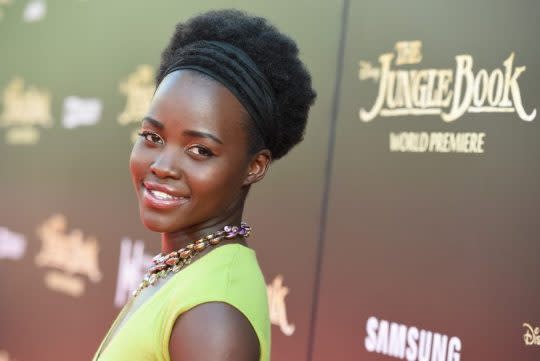Lupita Nyong'o On Choosing a 'Small Play' Over 'Wife' Roles in Movies

“Why would such a big star choose to do such a small play?”
Lupita Nyong’o was recently asked this question by a journalist interviewing her about Eclipsed, the Broadway drama that earned Nyong’o her first Tony Award nomination earlier today. As the actress explains in an essay that appears in the new issue of Lenny, the newsletter/magazine published by Lena Dunham and Jenni Konner, she chose to do this “small play” because it gave her an opportunity to “share in the incredible (and too rare) freedom of playing a fully rendered African woman.”
“So often women of color are relegated to playing simple tropes: the sidekick, the best friend, the noble savage, or the clown,”writes Nyong’o, who won an Oscar in 2015 for 12 Years a Slave. “We are confined to being a simple and symbolic peripheral character — one who doesn’t have her own journey or emotional landscape.”
Related: Jennifer Lawrence Opens Up About Making Less Money Than Her Male Co-Stars
Her words echo many of the sentiments expressed in a recent Vulture essay that asks why so many prominent black actors have been cast in film roles that obscure their appearances. Pointing to people like Nyong’o and Idris Elba, both have whom have recently played parts that either rely solely on their voices or obscure their appearances, Kyle Buchanan writes, “Perhaps it’s just another symptom of Hollywood’s current failure when it comes to actors of color: If movie studios continue to treat black faces as an onscreen rarity, it’s not much of a jump for those same stars to then be deemed exotic-looking and alien.” Of Nyong’o specifically, he says, “since her Oscar win, no white director has cast her in a live-action role that lets her live in her own black skin.”
In her Lenny essay Nyong’o addresses her motion-capture and voice work in Star Wars: The Force Awakens and The Jungle Book, saying, “I think sometimes a singular catharsis can be found in genre storytelling — as I found when playing a thousand-year-old woman (Maz Kanata in Star Wars: The Force Awakens) and a wolf mother (Raksha in The Jungle Book).” But she adds, “I’m able to be more engaged in roles such as those than I would be in playing ‘the wife’ when she is written with no motivation or singularity.”
Related: Movie Stars Who Just Earned Tony Nominations
In other words, what Nyong’o is saying echoes Buchanan’s point: She would rather take a juicy part in a big movie where she remains obscured or a juicy part where she’s fully seen in a “small play” because those are the best options right now for a black woman who wants to challenge herself.
Hopefully that will change, especially as Nyong’o gets the chance to prove her leading lady bonafides onscreen again in Mira Nair’s upcoming drama Queen of Katwe. In the meantime, she can feel pretty good about doing that small play since she now has a Tony nomination to her credit because of it.

